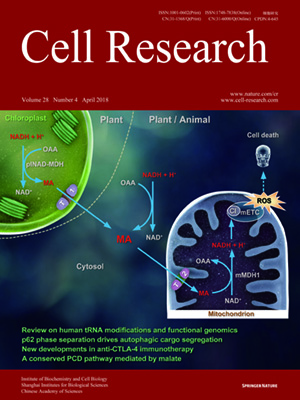
Volume 28, No 4, Apr 2018
ISSN: 1001-0602
EISSN: 1748-7838 2018
impact factor 17.848*
(Clarivate Analytics, 2019)
Volume 28 Issue 4, April 2018: 476-490
ORIGINAL ARTICLES
Setd2 deficiency impairs hematopoietic stem cell self-renewal and causes malignant transformation
Yuan-Liang Zhang 1, Jie-Wen Sun 1, Yin-Yin Xie 1, Yan Zhou 2, Ping Liu 1
, Jia-Chun Song1, Chun-Hui Xu3, Lan Wang3, Dan Liu 4, Ai-Ning Xu 1
,Zhu Chen 1,5, Sai-Juan Chen 1,5, Xiao-Jian Sun 1 and Qiu-Hua Huang 1
1 State Key Laboratory of Medical Genomics, Shanghai Institute of Hematology, Rui-Jin Hospital, Shanghai Jiao Tong University School of Medicine, Shanghai 200025, China; 2Central Laboratory, Ren-Ji Hospital, Shanghai Jiao Tong University School of Medicine, Shanghai 200127, China; 3Key Laboratory of Stem Cell Biology, Institute of Health
Sciences, Shanghai Institutes for Biological Sciences, Chinese Academy of Sciences & Shanghai Jiao Tong University School of Medicine, Shanghai 200031, China; 4Key Laboratory
of Systems Biomedicine, Ministry of Education, Shanghai Center for Systems Biomedicine, Shanghai Jiao Tong University, 800 Dongchuan Road, Shanghai 200240, China and 5The
National Research Center for Translational Medicine, Shanghai Jiao Tong University School of Medicine, Shanghai, China
Correspondence: Zhu Chen (zchen@stn.sh.cn) or Sai-Juan Chen (sjchen@stn.sh.cn) or Xiao-Jian Sun (xjsun@sibs.ac.cn) or Qiu-Hua Huang (hqh10632@rjh.com.cn)
The histone H3 lysine 36 methyltransferase SETD2 is frequently mutated in various cancers, including leukemia. However, there has not been any functional model to show the contribution of SETD2 in hematopoiesis or the causal role of SETD2 mutation in tumorigenesis. In this study, using a conditional Setd2 knockout mouse model, we show that Setd2 deficiency skews hematopoietic differentiation and reduces the number of multipotent progenitors; although the number of phenotypic hematopoietic stem cells(HSCs) in Setd2-deleted mice is unchanged, functional assays, including serial BM transplantation, reveal that the self-renewal and competitiveness of HSCs are impaired. Intriguingly, Setd2-deleted HSCs, through a latency period, can acquire abilities to overcome the growth disadvantage and eventually give rise to hematopoietic malignancy characteristic of myelodysplastic syndrome. Gene expression profile of Setd2-deleted hematopoietic stem/progenitor cells (HSPCs) partially resembles that of Dnmt3a/Tet2 double knockout HSPCs, showing activation of the erythroid transcription factor Klf1-related pathway, which plays an important role in hematopoietic malignant transformation. Setd2 deficiency also induces DNA replication stress in HSCs, as reflected by an activated E2F gene regulatory network and repressed expression of the ribonucleotide reductase subunit Rrm2b, which results in proliferation and cell cycle abnormalities and genomic instability, allowing accumulation of secondary mutation(s) that synergistically contributes to tumorigenesis. Thus, our results demonstrate that Setd2 is required for HSC self-renewal, and provide evidence supporting the causal role of Setd2 deficiency in tumorigenesis. The underlying mechanism shall advance our understanding of epigenetic regulation of cancer and provide potential new therapeutic targets.
10.1038/s41422-018-0015-9
FULL TEXT | PDF
Browse 1629


